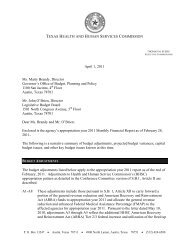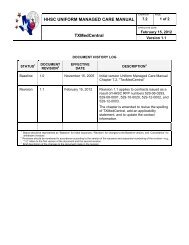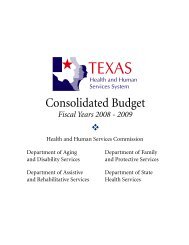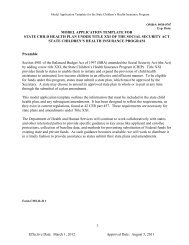(RFP) for Recovery Audit Contractor (RAC) - Texas Health and ...
(RFP) for Recovery Audit Contractor (RAC) - Texas Health and ...
(RFP) for Recovery Audit Contractor (RAC) - Texas Health and ...
You also want an ePaper? Increase the reach of your titles
YUMPU automatically turns print PDFs into web optimized ePapers that Google loves.
1.8.2 Conflicts of Interest<br />
A conflict of interest is a set of facts or circumstances in which either a respondent or anyone<br />
acting on its behalf in connection with this procurement has past, present or currently planned<br />
personal, professional or financial interests or obligations that, in HHSC’s determination, would<br />
actually or apparently conflict or interfere with the respondent’s contractual obligations to HHSC.<br />
A conflict of interest would include circumstances in which a party’s personal, professional or<br />
financial interests or obligations may directly or indirectly:<br />
make it difficult or impossible to fulfill its contractual obligations to HHSC in a manner<br />
that is consistent with the best interests of the State of <strong>Texas</strong>;<br />
impair, diminish or interfere with that party’s ability to render impartial or objective<br />
assistance or advice to HHSC; or<br />
provide the party with an unfair competitive advantage in future HHSC procurements.<br />
Neither the respondent nor any other person or entity acting on its behalf, including but not<br />
limited to subcontractors, employees, agents <strong>and</strong> representatives, may have a conflict of<br />
interest with respect to this procurement. Be<strong>for</strong>e submitting a proposal, Respondents should<br />
carefully review Article 12 of the Uni<strong>for</strong>m Terms <strong>and</strong> Conditions <strong>for</strong> additional in<strong>for</strong>mation<br />
concerning conflicts of interests.<br />
A respondent must certify that it does not have personal or business interests that present a<br />
conflict of interest with respect to the <strong>RFP</strong> <strong>and</strong> resulting contract (see the Required<br />
Certifications <strong>for</strong>m). Additionally, if applicable, the respondent must disclose the details of all<br />
actual or arguable potential conflicts of interest. The respondent must describe the specific<br />
measures it will take to ensure that there will be no actual conflict of interest <strong>and</strong> that its<br />
fairness, independence <strong>and</strong> objectivity will be maintained (see the respondent In<strong>for</strong>mation <strong>and</strong><br />
Disclosures <strong>for</strong>m). HHSC will determine to what extent, if any, a potential conflict of interest can<br />
be mitigated <strong>and</strong> managed during the term of the contract. Failure to identify potential conflicts<br />
of interest may result in HHSC’s disqualification of a proposal or termination of the contract.<br />
Examples of potential conflicts of interest under this contract include any auditing services (i.e.<br />
improper payment <strong>and</strong> fraud, waste, or abuse identification), or any other type services that you<br />
or others may in any way construe as a potential conflict with or duplication of <strong>RAC</strong> services,<br />
provided to any HHSC agencies or <strong>Texas</strong> Medicaid-contracted managed care organizations.<br />
Respondents must disclose <strong>and</strong> describe any contracts it, its parent, subsidiary, sister or<br />
affiliated entity currently holds, or anticipates holding, or per<strong>for</strong>med during the past 5 years with<br />
entities <strong>for</strong> federal or state audit services, such as the Payment Error Rate Measurement<br />
(PERM), Medicaid Integrity Program (MIP), or other federal <strong>and</strong> state audits or reviews.<br />
1.8.3 Former Employees of a State Agency<br />
Respondents must comply with <strong>Texas</strong> <strong>and</strong> federal laws <strong>and</strong> regulations relating to the hiring of<br />
<strong>for</strong>mer state employees (see e.g., <strong>Texas</strong> Government Code §572.054 <strong>and</strong> 45 C.F.R. §74.43).<br />
Such “revolving door” provisions generally restrict <strong>for</strong>mer agency heads from communicating<br />
with or appearing be<strong>for</strong>e the agency on certain matters <strong>for</strong> two years after leaving the agency.<br />
The revolving door provisions also restrict some <strong>for</strong>mer employees from representing clients on<br />
matters that the employee participated in during state service or matters that were in the<br />
employees’ official responsibility.<br />
13

















